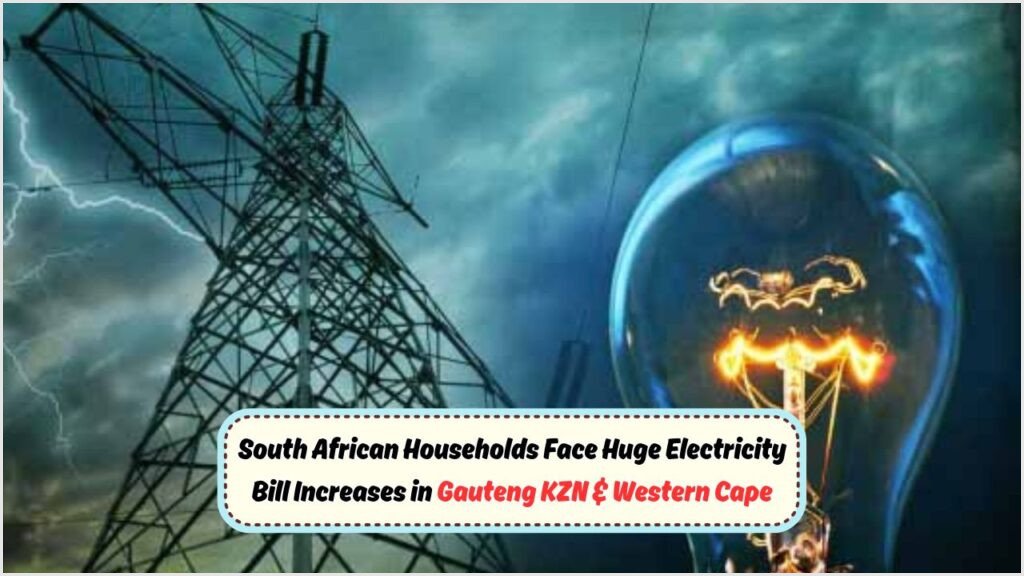Electricity Prices to Increase on August 15: South Africa is on the brink of a significant change as electricity prices are set to surge on August 15. This increase is poised to affect millions of households and businesses across key provinces such as Gauteng, KwaZulu-Natal, and the Western Cape. The anticipated rise in electricity tariffs comes as a response to various economic pressures and the need to maintain infrastructure. As electricity is a crucial component of everyday life, this adjustment will have far-reaching impacts on the cost of living and business operations. Residents and businesses alike are urged to prepare for the financial implications that this change will bring.
Impact on Gauteng’s Economy and Households
The increase in electricity prices is expected to have a profound effect on Gauteng, the economic powerhouse of South Africa. With its vast population and industrial base, the province will likely see a ripple effect on various sectors. Households may need to reevaluate their budgets as monthly electricity bills climb, potentially leading to reduced discretionary spending. Small businesses, already grappling with tight margins, may face additional financial strain, impacting their ability to operate profitably.
- Increased cost of living for households
- Higher operational costs for businesses
- Potential impact on employment rates
- Increased pressure on public services
KwaZulu-Natal’s Resilience Amidst Rising Electricity Costs
KZN, known for its vibrant tourism and agriculture sectors, will also feel the pinch of rising electricity costs. The hospitality industry, in particular, faces challenges as hotels and restaurants try to manage increased utility expenses without passing the entire burden onto customers. Meanwhile, farmers may struggle with higher costs for irrigation and processing, which could lead to increased food prices. Despite these challenges, KZN has a history of resilience and innovation, which may help mitigate some of the negative effects.
| Sector | Impact | Potential Solutions | Long-term Outlook |
|---|---|---|---|
| Tourism | Increased costs | Energy-efficient practices | Moderate recovery |
| Agriculture | Higher input costs | Alternative energy sources | Gradual adaptation |
| Retail | Reduced consumer spending | Cost management strategies | Uncertain |
| Manufacturing | Increased production costs | Operational efficiency | Slow growth |
Western Cape’s Response to Electricity Price Hikes
The Western Cape is no stranger to energy challenges, having faced similar issues in the past. The province’s government has been proactive in exploring renewable energy solutions to offset the impact of rising electricity prices. With initiatives aimed at increasing solar power adoption and improving grid efficiency, the Western Cape is positioning itself to better manage the forthcoming challenges. This strategic approach not only seeks to alleviate immediate financial pressures but also contributes to long-term sustainability.
| Initiative | Description | Expected Outcome | Timeline |
|---|---|---|---|
| Solar Power Projects | Increase solar installations | Reduce reliance on grid | 2-5 years |
| Energy Efficiency Programs | Promote efficient appliances | Lower energy consumption | Ongoing |
| Public Awareness Campaigns | Educate on energy savings | Behavioral change | Continuous |
| Infrastructure Upgrades | Modernize power grid | Improved reliability | 5-10 years |
Preparing for the Electricity Price Surge
As the country braces for the anticipated price increase, preparation becomes key. Households and businesses can take proactive steps to mitigate the impact. Energy audits can help identify areas where consumption can be reduced, while investments in energy-efficient technology can cut long-term costs. Additionally, exploring alternative energy sources like solar panels can provide relief from grid dependency.
- Conduct energy audits to identify savings
- Invest in energy-efficient appliances
| Action | Benefit | Cost | Implementation Time |
|---|---|---|---|
| Energy Audit | Identify inefficiencies | Low to moderate | Short-term |
| Energy-Efficient Appliances | Reduce energy bills | Moderate | Medium-term |
| Solar Panel Installation | Decrease grid reliance | High | Long-term |
| LED Lighting | Lower consumption | Low | Short-term |
Exploring Renewable Energy Solutions
Many South Africans are turning to renewable energy solutions to combat rising electricity prices. Options such as solar, wind, and hydroelectric power offer sustainable alternatives that can significantly reduce household and business electricity costs over time. By investing in these technologies, individuals and companies can not only save money but also contribute to environmental conservation efforts.
Solar Energy Benefits
- Reduction in electricity costs
- Environmentally friendly
- Energy independence
- Increased property value
- Government incentives
Understanding the Economic Implications
The economic implications of the electricity price increase are vast and multifaceted. As prices soar, the cost of goods and services will likely increase, affecting everything from groceries to transportation. This could lead to inflationary pressures, impacting interest rates and overall economic growth. Stakeholders across various sectors must work together to find innovative solutions to these challenges.
Inflationary Pressures
- Increased cost of goods
- Potential rise in interest rates
- Impact on economic growth
- Need for strategic planning
The Role of Government and Policy
Government intervention and policy adjustments will play a crucial role in managing the impact of rising electricity prices. Policies aimed at promoting energy efficiency and supporting renewable energy initiatives can help alleviate some of the financial burdens. Additionally, subsidies or incentives for low-income households may provide much-needed relief to those most affected by the price hike.
Government Initiatives
- Subsidies for renewable energy adoption
- Incentives for energy efficiency
- Support for low-income households
- Infrastructure investment
- Policy reforms
FAQ Section
What is the reason for the electricity price increase?
The price increase is due to rising operational costs and the need for infrastructure maintenance.
How will this impact my monthly expenses?
Expect higher electricity bills, which may lead to adjustments in your household budget.
Are there any government programs to help offset costs?
Yes, there may be subsidies and incentives available for renewable energy adoption and energy efficiency improvements.
What can businesses do to manage increased costs?
Businesses can conduct energy audits, invest in efficient technology, and explore alternative energy sources.
Is solar energy a viable solution for reducing costs?
Yes, solar energy can significantly reduce dependency on the grid and lower long-term electricity costs.
How can residents prepare for the upcoming electricity price increase?
By conserving energy and exploring alternative power sources.
What factors are contributing to the significant electricity price increase on August 15?
Increased demand, maintenance costs, and supply shortages are key contributors.





